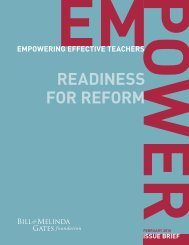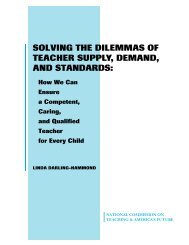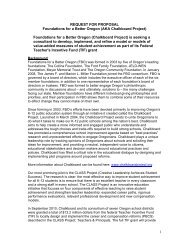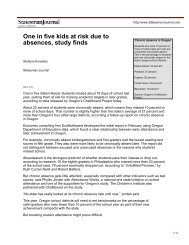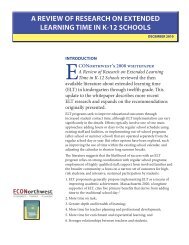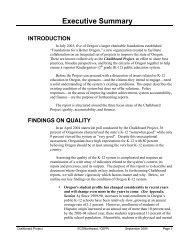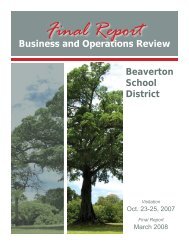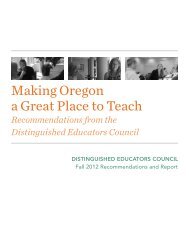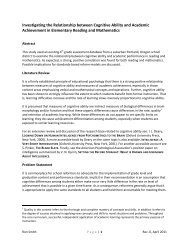Tapping the Potential - Alliance for Excellent Education
Tapping the Potential - Alliance for Excellent Education
Tapping the Potential - Alliance for Excellent Education
Create successful ePaper yourself
Turn your PDF publications into a flip-book with our unique Google optimized e-Paper software.
A L L I A N C E F O R E X C E L L E N T E D U C AT I O Nteacher degrees on student per<strong>for</strong>mance in <strong>the</strong> subject areas of ma<strong>the</strong>matics, science,English, and history. The NELS: 88 was a nationally representative survey of about24,000 eighth graders in 1988, approximately 18,000 of whom were surveyed again in1990. It was found that several teacher characteristics do appear to make a differencein student per<strong>for</strong>mance. Teachers certified in ma<strong>the</strong>matics and those with bachelor’sor master’s degrees in ma<strong>the</strong>matics and science were associated with higher studentper<strong>for</strong>mance scores. Ma<strong>the</strong>matics and science degrees were not found to influence studentoutcomes in English and history, suggesting that it is <strong>the</strong> subject-specific trainingra<strong>the</strong>r than general teaching ability that results in improved per<strong>for</strong>mance. This findingsuggests that student achievement in technical subjects can be improved by requiringin-subject teaching.Hanushek, Eric, John Kain, and Steven Rivkin. “Why Public Schools LoseTeachers.” National Bureau of Economic Research, Working Paper no. W8599 (2001).Many school districts experience difficulties attracting and retaining teachers, and<strong>the</strong> impending retirement of a substantial fraction of public school teachers raises <strong>the</strong>specter of severe shortages in some public schools. Schools in urban areas serving economicallydisadvantaged and minority students appear particularly vulnerable. Thispaper investigates <strong>the</strong> factors that affect <strong>the</strong> probability that teachers switch schools orexit <strong>the</strong> public schools entirely. The authors make use of matched student/teacherpanel data on Texas public elementary schools to gain a better understanding of <strong>the</strong>effects of salary and o<strong>the</strong>r school factors on teacher transitions.The results show that teacher transitions are much more strongly related to particularstudent characteristics than to salary differentials. Schools serving large numbers ofacademically disadvantaged, black, or Hispanic students tend to lose a substantial fractionof teachers each year both to o<strong>the</strong>r districts and out of <strong>the</strong> Texas public schoolsentirely. An implication is that <strong>the</strong> supply curve faced by <strong>the</strong>se districts differs markedlyfrom that faced by middle- and upper-middle-class communities, in which a far lowerproportion of teachers seek to improve <strong>the</strong>ir employment arrangement by switching toano<strong>the</strong>r public school.Hinds, Michael. Teaching as a Clinical Profession. New York: CarnegieCorporation of New York, 2002.This is an analysis of <strong>the</strong> teaching profession in terms of teacher preparation andpractice in <strong>the</strong> first years of teaching. The report recommends that teaching become aclinical practice profession like that of medicine, including <strong>the</strong> use of “clinical residencies”that function as highly structured induction programs facilitated by institutions ofhigher education. This report details <strong>the</strong> rationale behind <strong>the</strong> Carnegie Corporation’sTeachers <strong>for</strong> a New Era initiative.Ingersoll, Richard. Is There Really a Teacher Shortage? Seattle: Center <strong>for</strong> <strong>the</strong>Study of Teaching and Policy, 2003.Richard Ingersoll builds on his hypo<strong>the</strong>sis that school staffing problems are not primarilydue to teacher shortages, in <strong>the</strong> sense of an insufficient supply of qualifiedteachers. Ra<strong>the</strong>r, <strong>the</strong> data indicate that staffing problems are primarily due to a “revolv-58



